Claude Castelluccia
Constrained Differentially Private Federated Learning for Low-bandwidth Devices
Feb 27, 2021
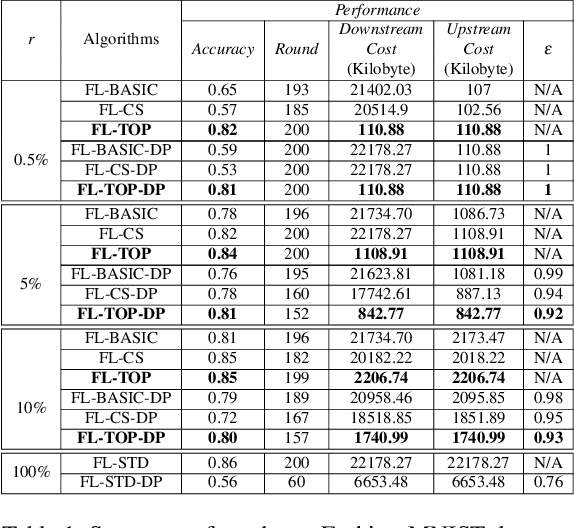
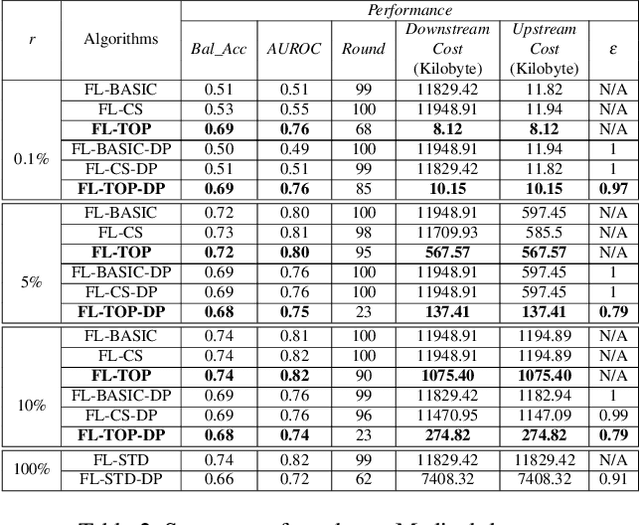

Abstract:Federated learning becomes a prominent approach when different entities want to learn collaboratively a common model without sharing their training data. However, Federated learning has two main drawbacks. First, it is quite bandwidth inefficient as it involves a lot of message exchanges between the aggregating server and the participating entities. This bandwidth and corresponding processing costs could be prohibitive if the participating entities are, for example, mobile devices. Furthermore, although federated learning improves privacy by not sharing data, recent attacks have shown that it still leaks information about the training data. This paper presents a novel privacy-preserving federated learning scheme. The proposed scheme provides theoretical privacy guarantees, as it is based on Differential Privacy. Furthermore, it optimizes the model accuracy by constraining the model learning phase on few selected weights. Finally, as shown experimentally, it reduces the upstream and downstream bandwidth by up to 99.9% compared to standard federated learning, making it practical for mobile systems.
Compression Boosts Differentially Private Federated Learning
Nov 10, 2020

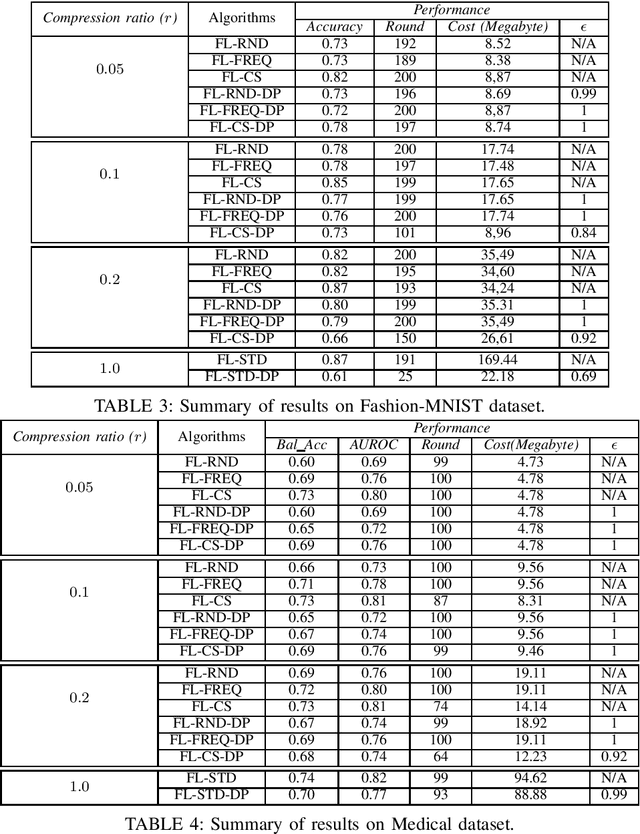

Abstract:Federated Learning allows distributed entities to train a common model collaboratively without sharing their own data. Although it prevents data collection and aggregation by exchanging only parameter updates, it remains vulnerable to various inference and reconstruction attacks where a malicious entity can learn private information about the participants' training data from the captured gradients. Differential Privacy is used to obtain theoretically sound privacy guarantees against such inference attacks by noising the exchanged update vectors. However, the added noise is proportional to the model size which can be very large with modern neural networks. This can result in poor model quality. In this paper, compressive sensing is used to reduce the model size and hence increase model quality without sacrificing privacy. We show experimentally, using 2 datasets, that our privacy-preserving proposal can reduce the communication costs by up to 95% with only a negligible performance penalty compared to traditional non-private federated learning schemes.
Federated Learning in Adversarial Settings
Oct 15, 2020
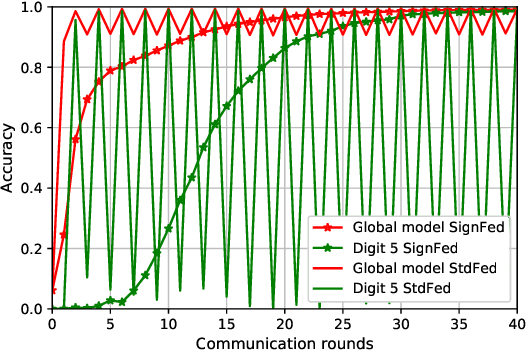

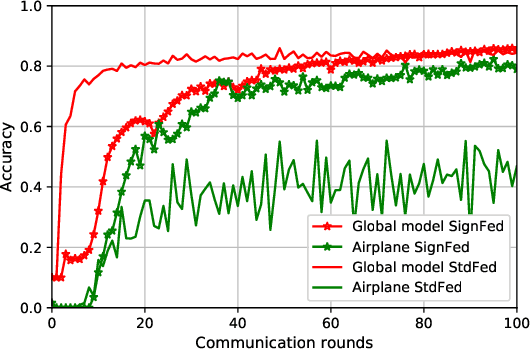
Abstract:Federated Learning enables entities to collaboratively learn a shared prediction model while keeping their training data locally. It prevents data collection and aggregation and, therefore, mitigates the associated privacy risks. However, it still remains vulnerable to various security attacks where malicious participants aim at degrading the generated model, inserting backdoors, or inferring other participants' training data. This paper presents a new federated learning scheme that provides different trade-offs between robustness, privacy, bandwidth efficiency, and model accuracy. Our scheme uses biased quantization of model updates and hence is bandwidth efficient. It is also robust against state-of-the-art backdoor as well as model degradation attacks even when a large proportion of the participant nodes are malicious. We propose a practical differentially private extension of this scheme which protects the whole dataset of participating entities. We show that this extension performs as efficiently as the non-private but robust scheme, even with stringent privacy requirements but are less robust against model degradation and backdoor attacks. This suggests a possible fundamental trade-off between Differential Privacy and robustness.
Differentially Private Mixture of Generative Neural Networks
Jul 13, 2018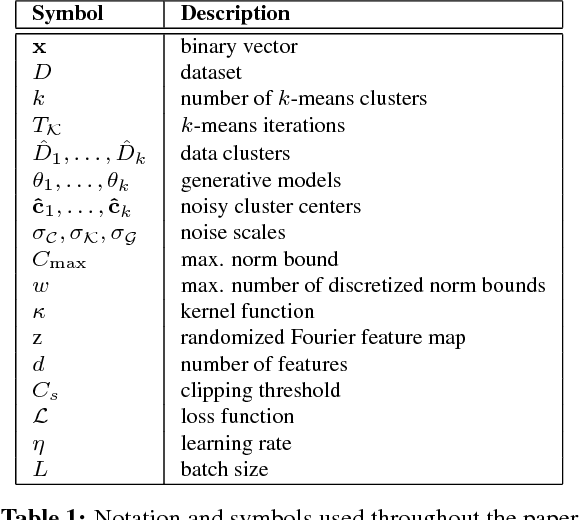
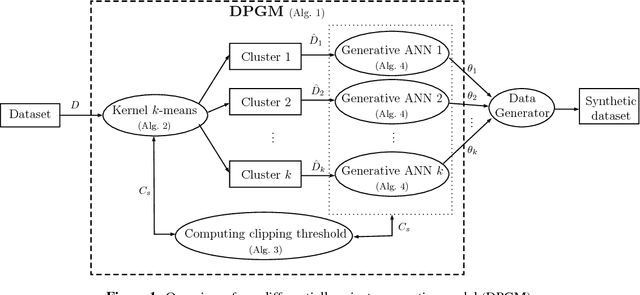


Abstract:Generative models are used in a wide range of applications building on large amounts of contextually rich information. Due to possible privacy violations of the individuals whose data is used to train these models, however, publishing or sharing generative models is not always viable. In this paper, we present a novel technique for privately releasing generative models and entire high-dimensional datasets produced by these models. We model the generator distribution of the training data with a mixture of $k$ generative neural networks. These are trained together and collectively learn the generator distribution of a dataset. Data is divided into $k$ clusters, using a novel differentially private kernel $k$-means, then each cluster is given to separate generative neural networks, such as Restricted Boltzmann Machines or Variational Autoencoders, which are trained only on their own cluster using differentially private gradient descent. We evaluate our approach using the MNIST dataset, as well as call detail records and transit datasets, showing that it produces realistic synthetic samples, which can also be used to accurately compute arbitrary number of counting queries.
 Add to Chrome
Add to Chrome Add to Firefox
Add to Firefox Add to Edge
Add to Edge